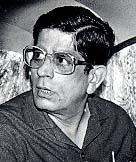
The Rediff Interview / Kollaikal Madhavan
'The Swiss would never hand over the Bofors papers had there been
no big crime'
 Ever since the Swiss government handed over the Bofors
documents to India, Kollaikal Madhavan, the former
joint director of the Central Bureau of Investigation, has
been spending restless days at his ancestral home in Salem, in
Tamil Nadu.
Ever since the Swiss government handed over the Bofors
documents to India, Kollaikal Madhavan, the former
joint director of the Central Bureau of Investigation, has
been spending restless days at his ancestral home in Salem, in
Tamil Nadu.
"I escaped from Delhi to avoid the media when the Bofors papers
arrived in India, but the telephone here has not stopped ringing
since then," the former supersleuth said.
It was Madhavan who cracked the Swiss bank accounts of
those who allegedly received kickbacks in the Bofors deal.
"I had painstakingly completed nearly 80 per cent investigations
into the Bofors scandal," he says.
But sensing the danger that Madhavan's probe would bring to
the public servants at home, the then Congress government is believed
to have taken off the case from him on October 22, 1991. And feeling
that political interference was becoming unbearable to his relentless
investigative spirit, the CBI officer took premature retirement
on November 1, 1992.
Madhavan now practises law at the Supreme Court.
In a telephonic interview with George Iype, the
former CBI joint director told Rediff On The Net how the
contents of the secret Bofors papers could change political equations
in India. But he fears political interference could also very
well bury the case forever. Excerpts from the conversation:
Will the contents of the Bofors papers be explosive?
The Bofors papers will be quite revealing because big names
are sure to surface. The Swiss government would have never handed
over these documents to India had there been no big crime.
Michel Andre Fels, the jurist in the Swiss justice ministry has
stated that if the same crime had been committed in Switzerland,
prosecution would have commenced immediately.
All these years the Swiss authorities have been maintaining that
they would release the documents only if the bank transactions
involved a big bribe. Thus these documents prove corruption and
the ball is in India's court.
Up to what stage had you carried out investigations into the
Bofors case?
I had completed nearly 80 per cent of investigations into
the case. In fact, it was the CBI team led by me which succeeded
in cracking the Swiss accounts -- Tulip, Lotus and Mount Blanc -- held
on behalf of the appellants (the three Hindujas brothers, Ottavio
Quattrocchi and Win Chadha).
Will the documents throw new light on the activity of these
people?
Certainly. The papers will, especially, reveal the role of
the Italian businessman Ottavio Quattrocchi.
Why is Quattrocchi's account the most important?
The final account into which Bofors made payments belonged
to Quattrocchi. Therefore, his will be the most interesting account
for the CBI to examine. Though Quattrocchi operated the account,
I believe the documents will further reveal who the real owner
of the account is.
But will the documents in the CBI custody contain details of
Quattrocchi's account?
Definitely. I think so. The papers pertaining to Quattrocchi
are expected to be an 'A' Form, which will list on whose behalf
he held the secret Swiss account.
Do you think the CBI will be allowed to do an honest job?
I fear political interference can mar the prospects of the
Bofors case.
Did you face political interference when you handled the Bofors
case?
I did not face any political interference when I was investigating
the Bofors case.
But you resigned from the CBI over your differences in the
case with then director S K Dutta.
I took premature retirement when I was handling the securities
scam. Yes, I had certain differences with the government on that
case, but not on the Bofors case.
If the CBI does an honest job on Bofors, will it upset
political equations in the country?
If the CBI is able to unearth the contents of the documents
without any outside pressure then it could upset the current political
equations in the country because Bofors is a politically sensitive
case.
But can present Indian laws book the guilty if the CBI
unearths the recipients of the Bofors booty?
If the Bofors documents prove that bribes had been paid under
the guise of commissions, then the public servant becomes a bribe-taker
which is punishable under the Prevention of Corruption Act.
|






 Ever since the Swiss government handed over the Bofors
documents to India, Kollaikal Madhavan, the former
joint director of the Central Bureau of Investigation, has
been spending restless days at his ancestral home in Salem, in
Tamil Nadu.
Ever since the Swiss government handed over the Bofors
documents to India, Kollaikal Madhavan, the former
joint director of the Central Bureau of Investigation, has
been spending restless days at his ancestral home in Salem, in
Tamil Nadu.